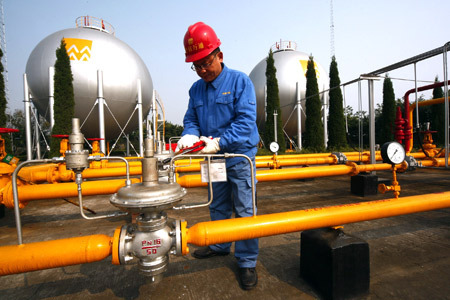Top Biz News
Market blamed for gas pains
By Wang Qian (China Daily)
Updated: 2009-11-24 08:01
|
 A worker checks a natural gas pipeline in Suining, Sichuan province, yesterday. A gas shortage during the recent cold weather has eased, authorities have said. [China Daily] |
"The lack of a competitive mechanism in China's gas market has given major gas suppliers few incentives to expand gas output at current low prices," Lin Boqiang, professor at the Center of China Energy Economics Research in Xiamen University, told China Daily yesterday.
The gas crisis has raised public doubts about the country's monopolistic gas market and the capacity of PetroChina and Sinopec, the country's main gas suppliers, which issued emergency gas in several provinces and regions including Chongqing municipality and Zhejiang province due to the sudden increased consumption and limited storage.
"In order to meet the surging gas demand, we should open our gas market and welcome more domestic and foreign companies to create a competitive mechanism, which will trigger an exploration of the potential gas capacity," Lin said.
Gas production reached 77.5 billion cu m last year, a year-on-year increase of 15 percent. Some experts predicted that China will consume 400 billion cu m in 2030 with nearly 40 percent imported from abroad, Jia Chengzao, director of the CNPC Petroleum Institute, said at an energy forum in July this year.
| ||||
Raising natural gas prices is the first step and then the gas market will open further, he said.
But Cao Changqing, head of the price department of the National Development and Reform Commission, the country's top economic planner, said on Thursday that China will not adjust the price of natural gas or issue a major price reform plan anytime soon.
Some netizens think the oil giants are curtailing the market supply to obtain a higher price, but both companies denied that and said they are at full capacity.
Cities in the central and southern parts of the country are still facing severe gas shortages after being hit by a cold snap and heavy snow.
Zhengzhou Gas Group said the city is facing a shortage of 50 million cu m of natural gas this year. Yesterday, the company suspended natural gas supply to taxis at five of the city's nine gas stations.
Wuhan, the capital of Hubei province and a city in the middle reaches of the Yangtze River, cut natural gas supply to all industries and businesses to ensure residential consumption last week after one of its worst snowstorms in the past four decades, facing a shortage of about 1 million cu m of gas every day.
The unusually early snowstorm in the country this winter has resulted in a surge in gas consumption for heating, diverting supplies and affecting public transport and industries.
In Chongqing, local media reported that taxis are forming long lines for compressed natural gas.
The gas squeeze is also affecting industries in Hangzhou, Zhejiang province, with dozens of plants forced to shut down last week.
More than 30 gas-consuming companies were affected with 17 of them having their supply cut off, Zhejiang Daily reported last week.
This year's gas supply to Hangzhou is 310 million cu m, while the city has already consumed nearly 319 cu m, the local government said.
Gas supply in downtown Hangzhou was back to normal with the temperature rising to 14 C on Sunday.













